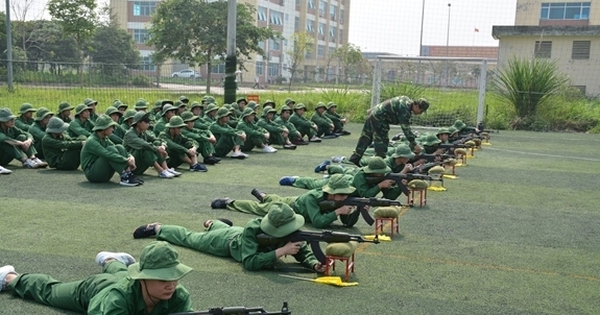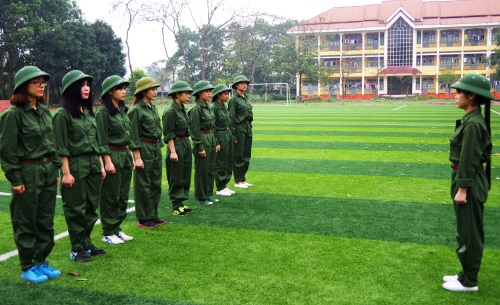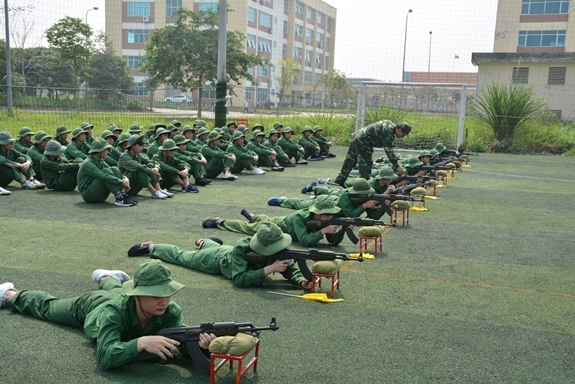Subjects of defense and security education in Vietnam
What are the subjects of defense and security education in Vietnam? - Quang Huy (Binh Dinh, Vietnam)

Subjects of defense and security education in Vietnam (Internet image)
Regarding this issue, LawNet would like to answer as follows:
1. What is national defense and security knowledge?
According to Clause 1, Article 3 of the Law on National Defense and Security Education 2013, defense and security knowledge include the point system of the Communist Party of Vietnam, the State's policies and laws on defense and security, the nation's tradition of building and defending the country, and military skills.
In which the goal of national defense and security education is to promote patriotism, the tradition of nation building and defense, national pride, and self-respect; raise awareness and responsibility; self-consciously perform national defense and security tasks; and protect the socialist Vietnamese Fatherland.
2. Subjects of defense and security education in Vietnam
2.1. For subjects in State agencies and organizations, political organizations, and socio-political organizations
Training on national defense and security knowledge for subjects in State agencies and organizations, political organizations, and socio-political organizations shall be implemented uniformly throughout the country.
Specifically, subjects of training in defense and security knowledge include:
- Officials; management officers;
- Elected deputies;
- Managers in state-owned enterprises;
- Persons working part-time in communes, wards, and townships (hereinafter referred to as commune level); heads of villages, hamlets, phum, squirrels, residential quarters (hereinafter referred to as hamlets); heads of unions in the village;
- Member of the Communist Party of Vietnam.
(Clause 1, 2, Article 14 of the Law on National Defense and Security Education 2013)
2.2. For managers of non-state enterprises, non-public non-business units
Specifically, in Clause 1, Article 15 of the Law on National Defense and Security Education 2013, managers of enterprises outside the state sector must participate in fostering defense and security knowledge, including:
(i) Enterprises of medium size or more;
(ii) Enterprises serving national defense and security;
(iii) Enterprises operating in remote, border, and island areas.
In addition, managers of non-public non-business units must participate in fostering national defense and security knowledge.
(Clause 2, Article 15 of the Law on National Defense and Security Education 2013)
2.3. For typical individuals, reputable people in the residential community
Typical individuals and prestigious people in the community who are subject to training in national defense and security knowledge are dignitaries, religious officials, village elders, clan heads, cultural and social activists, etc., as well as students of science and art.
(Clause 1, Article 16 of the Law on National Defense and Security Education 2013)
3. Regimes and benefits for subjects of training in defense and security knowledge
According to Article 18 of the Law on National Defense and Security Education 2013, subjects who are trained in defense and security knowledge are entitled to the following regimes and benefits:
- The subjects specified in Section 2.1, who are retaining defense and security knowledge, are entitled to full salaries and allowances; in the case of being far from the place of residence, accommodation shall be arranged, vehicle support or payment of train and vehicle fares for one-time travel and return, and meal support guaranteed by the state budget.
- Subjects specified in (i) and (ii) in Section 2.2 who are retaining knowledge of defense and security are entitled to full salary, allowances, vehicle support, or payment of train and vehicle fares for one-time travel, return, and meal support.
guaranteed by non-state enterprises or non-public non-business units;
Expenses for fostering knowledge of national defense and security and providing accommodations for subjects far from their places of residence shall be covered by the state budget.
- Subjects specified in (iii) in Section 2.2 and Section 2.3 who are retaining knowledge of national defense and security far from their residence may arrange accommodation, support vehicles, or pay for trains and cars once to go back and forth and support meals guaranteed by the state budget.
- Those who complete the training program on defense and security knowledge are granted a certificate.
4. The principles of defense and security education
National defense and security education must comply with the principles specified in Article 5 of the Law on National Defense and Security Education 2013, specifically as follows:
- Complying with the Constitution and laws of the Socialist Republic of Vietnam, under the leadership of the Communist Party of Vietnam, under the unified management of the State.
- National defense and security education are the responsibility of the political system and the entire people, in which the State plays the leading role.
- Combining defense and security education with ideological and political education, law dissemination and education, and associating it with building a strong comprehensive base.
- Comprehensive and focused education in appropriate forms; combination of theory and practice.
- National defense and security education programs and contents must be appropriate to each subject and promptly respond to the actual situation.
- Ensuring state secrets, planning, inheritance, development, science, modernity, and that they are easy to understand, practical, and effective.
- Cases of land rent exemption and reduction under the latest regulations in Vietnam
- Economic infrastructure and social infrastructure system in Thu Duc City, Ho Chi Minh City
- Regulations on ordination with foreign elements in religious organizations in Vietnam
- Increase land compensation prices in Vietnam from January 1, 2026
- Determination of land compensation levels for damage during land requisition process in Vietnam
- Who is permitted to purchase social housing according to latest regulations in Vietnam?
-

- Regulations on defense and security education ...
- 10:05, 30/11/2022
-

- How do schools and education institution in Vietnam ...
- 11:05, 12/11/2022
-

- Notable new policies of Vietnam effective as of ...
- 16:26, 11/04/2025
-
.Medium.png)
- Notable documents of Vietnam in the previous week ...
- 16:21, 11/04/2025
-
.Medium.png)
- Notable documents of Vietnam in the previous week ...
- 16:11, 02/04/2025
-
.Medium.png)
- Notable new policies of Vietnam to be effective ...
- 16:04, 02/04/2025
-
.Medium.png)
- Notable new policies of Vietnam effective from ...
- 14:51, 21/03/2025
 (1).png)
 Article table of contents
Article table of contents
